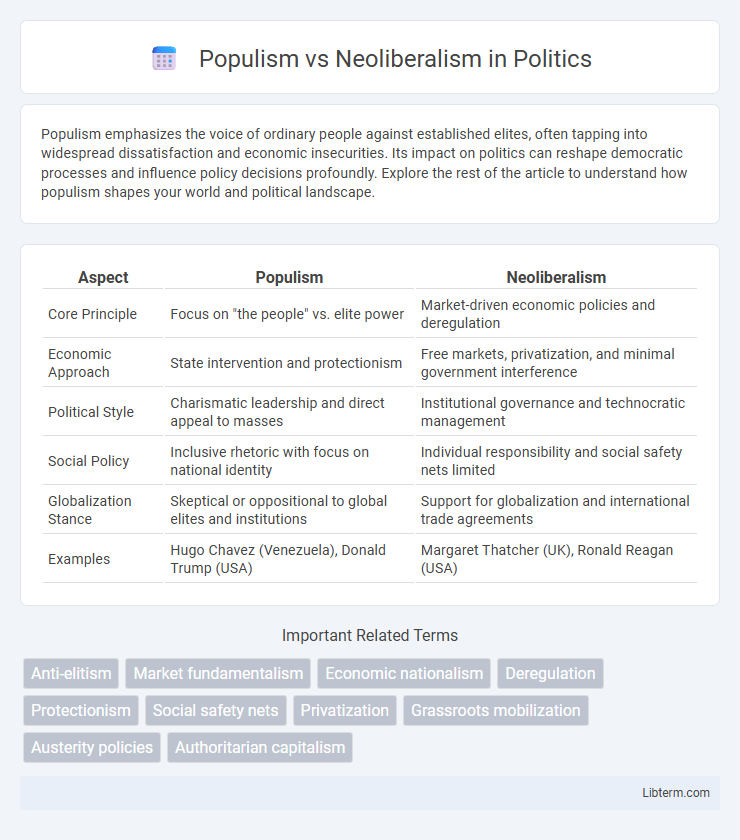Populism emphasizes the voice of ordinary people against established elites, often tapping into widespread dissatisfaction and economic insecurities. Its impact on politics can reshape democratic processes and influence policy decisions profoundly. Explore the rest of the article to understand how populism shapes your world and political landscape.
Table of Comparison
| Aspect | Populism | Neoliberalism |
|---|---|---|
| Core Principle | Focus on "the people" vs. elite power | Market-driven economic policies and deregulation |
| Economic Approach | State intervention and protectionism | Free markets, privatization, and minimal government interference |
| Political Style | Charismatic leadership and direct appeal to masses | Institutional governance and technocratic management |
| Social Policy | Inclusive rhetoric with focus on national identity | Individual responsibility and social safety nets limited |
| Globalization Stance | Skeptical or oppositional to global elites and institutions | Support for globalization and international trade agreements |
| Examples | Hugo Chavez (Venezuela), Donald Trump (USA) | Margaret Thatcher (UK), Ronald Reagan (USA) |
Understanding Populism: Core Principles and Ideologies
Populism centers on the dichotomy between "the pure people" and "the corrupt elite," advocating for direct representation and challenging established political and economic institutions. Core principles include anti-elitism, popular sovereignty, and a preference for policies perceived as benefiting the common people over market-driven neoliberal agendas. Unlike neoliberalism, which emphasizes free markets, deregulation, and global integration, populism often resists these trends by promoting protectionism, economic nationalism, and social welfare measures that align with the interests of its base.
Defining Neoliberalism: Origins and Evolution
Neoliberalism emerged in the mid-20th century as an economic philosophy advocating for free markets, deregulation, and reduced government intervention, rooted in the ideas of economists like Friedrich Hayek and Milton Friedman. Its evolution accelerated in the 1970s and 1980s with policies promoting privatization, globalization, and fiscal austerity, significantly influencing Western economic frameworks. The movement aimed to enhance market efficiency and individual freedom but faced criticism for increasing inequality and weakening social safety nets.
Historical Context: The Rise of Both Movements
Populism emerged prominently in the late 19th and early 20th centuries as a grassroots response to economic inequality and political corruption, emphasizing direct appeal to the "common people" against elite dominance. Neoliberalism gained momentum in the mid-20th century, particularly during the 1970s and 1980s, advocating for free markets, deregulation, and reduced government intervention to stimulate economic growth. Both movements reflect reactions to periods of social and economic upheaval: populism often arises from disenchantment with established institutions, while neoliberalism responds to perceived stagnation in interventionist economic policies.
Populism vs Neoliberalism: Key Differences
Populism centers on representing the interests of ordinary people against elite groups, often emphasizing nationalism and direct democratic participation, while neoliberalism advocates for free-market capitalism, deregulation, and reduced government intervention in the economy. Populism critiques neoliberal policies for increasing inequality and marginalizing working-class citizens, whereas neoliberalism promotes globalization and privatization as paths to economic growth. Key differences lie in their approach to governance and economic priorities: populism seeks protective policies for local populations, contrasting with neoliberalism's emphasis on market efficiency and individual entrepreneurial freedom.
Economic Policies: Contrasting Approaches
Populism emphasizes government intervention to protect domestic industries and promote social welfare through redistributive policies, often prioritizing nationalist agendas and reducing trade openness. Neoliberalism advocates for free-market capitalism, deregulation, reduced government spending, and increased globalization to stimulate economic growth and efficiency. These contrasting approaches illustrate divergent economic strategies: populism favors protectionism and state control, while neoliberalism supports market liberalization and minimal state interference.
Political Impact: Governance and Public Trust
Populism often challenges established neoliberal governance by advocating for increased state intervention and prioritizing popular demands over market-driven policies, leading to significant shifts in policy direction. This dynamic can erode public trust in traditional institutions associated with neoliberalism while simultaneously polarizing political landscapes. The tension between populist movements and neoliberal frameworks reshapes governance approaches, influencing regulatory priorities, social welfare programs, and citizen engagement in democratic processes.
Social Effects: Inclusion, Exclusion, and Divisions
Populism often emphasizes social inclusion for marginalized groups by challenging established elites but can simultaneously exacerbate societal divisions through us-versus-them rhetoric. Neoliberalism promotes economic inclusion via market mechanisms and individual opportunity but may increase social exclusion by widening income inequality and undermining social safety nets. The contrasting social effects highlight a tension between populism's collective identity politics and neoliberalism's market-driven individualism, each reshaping social cohesion in distinct ways.
Globalization: Opportunities and Challenges
Populism and neoliberalism present contrasting responses to globalization, where neoliberalism emphasizes free markets, deregulation, and global trade as drivers of economic growth and innovation. Populism often critiques globalization for exacerbating inequality, undermining national sovereignty, and eroding local cultures, advocating for protectionist policies and state intervention. The tensions between these ideologies highlight challenges in balancing economic integration with social cohesion and political autonomy in a globalized world.
Case Studies: Populism and Neoliberalism in Action
Populism often emerges as a reaction against neoliberal policies characterized by deregulation, privatization, and austerity measures that widen economic inequality and marginalize working-class populations. Case studies like Venezuela under Hugo Chavez showcase populism's appeal through state intervention and social welfare expansion, contrasting sharply with the neoliberal reforms in Chile during the Pinochet era, which emphasized free-market principles and reduced government involvement. These contrasting approaches highlight how populism and neoliberalism shape economic outcomes and political landscapes in diverse socio-economic contexts.
Future Prospects: Which Direction Will Prevail?
Populism and neoliberalism represent conflicting economic and political paradigms shaping future governance; populism emphasizes state intervention and protectionism, while neoliberalism advocates for market liberalization and deregulation. Emerging global challenges such as economic inequality, climate change, and geopolitical tensions will influence their trajectories, with populism gaining traction in regions facing social unrest and neoliberalism retaining strength in established global markets. The prevailing direction will depend on the balance between demands for social equity and sustained economic growth through open markets.
Populism Infographic

 libterm.com
libterm.com